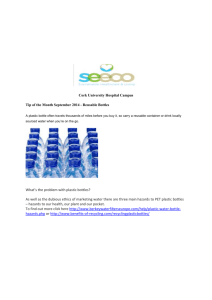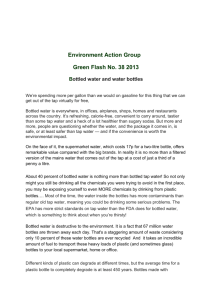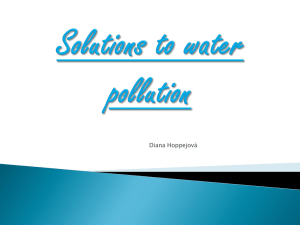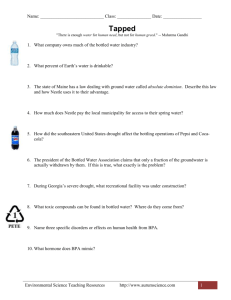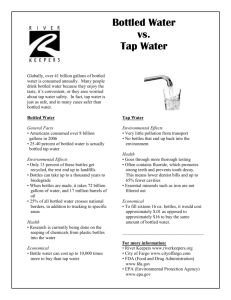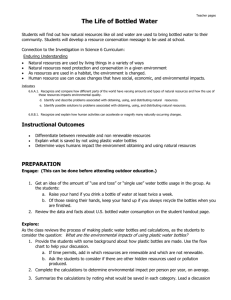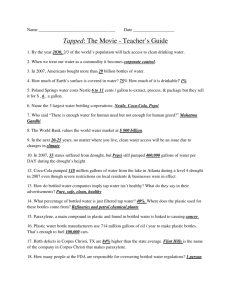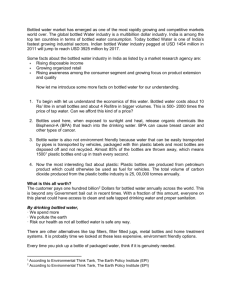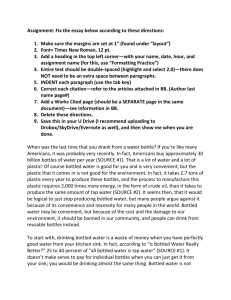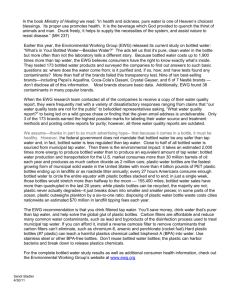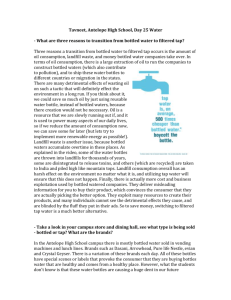Water Initiative Project 2014/2015
advertisement
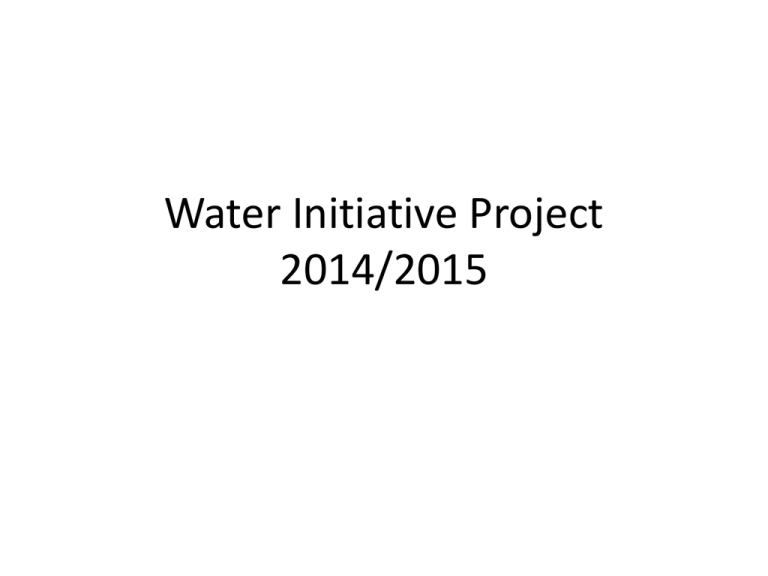
Water Initiative Project 2014/2015 OUR OBJECTIVES 1. More water fountains on campus (that are clean and accessible) 2. Students should be given free or heavily subsidised reusable water bottles in order to use the fountains 3. The campus shops should only stock water which is ethical and local 4. The café’s across campus should provide free water that people can help themselves to with biodegradable cups WHY WE WANT THIS what benefits will this bring to the students and wider global community? Students Well Being • “drinking water improves concentration, clears the mind, and reduces stress” Reducing Plastic Use • 10 million marine mammals and turtles in the north Pacific are killed every year by plastic in the ocean • Up to 63.4 billion plastic bottles are dumped into landfills and the ocean a year Questioning the ethics of commodification and privatisation of what should be a share resource • A report by the Canadian Polaris Institute argued that the big companies pay next to nothing for water they take from rural springs or public water systems and then sell a product back to us that is not as well-regulated as tap water, but is vastly more expensive Why is this campaign so important? UWE claims to be a sustainable university and yet falls very far behind on a number of issues which other universities are setting the precedent in. It is the responsibility of those that use the phrase to live up to its expectations. To achieve sustainability there needs to be a commitment to constant adaptation and change towards improvement; it requires changing habits and behaviours and not getting stuck in bad practice. Two unsustainable practices we’ve identified are: 1. the lack of water fountains on campus requires students to purchase plastic bottled water 2. The selling of certain brands of bottled water which are shrouded in Ethical issues DANONE Encouraging mothers to use their formula instead of breastfeeding across the world but most notably in the global South such as Indonesia They claimed their campaign was endorsed by WHO and UNICEF, even though both organisations denied this and asked for their logos to be removed from all literature COCA COLA Extreme over exploitation of water reserves in India, most infamously Kerala Pollution of water tables in India The company has faced legal action a number of times by unionised workers in a number of developing countries; in 2001 it was sued by union labourers in Colombia for violence against the workers A scandal hit the UK in 2004 when it was found that CocaCola were selling the UK market water which was sourced from the tap Alternatives Small Bristol based team of ethical entrepreneurs • Funds sustainable clean water projects in developing countries Donates 100% of its net profit to charity • Water from a British source • Certified organic source • Available in glass bottles 100% recyclable plastic bottles • • Carbon neutral Drop4drop is a charity founded by Life Water which strives to give 1000 litres of clean water to developing countries for every litre of Life water purchased in Britain Myths about bottled water 1. Bottled water is better for you research found that the concentration of certain chemicals, such as antimony, increase the longer the water sits in the plastic bottle 2. Bottled water tastes better “Think Outside the Bottle” Campaign has held countless taste tests comparing bottled water and tap water and generally the results favour tap water 3. Bottled water is convenient and cheap to buy Bottled water costs 240 to over 100,000 times more per gallon than tap water How to achieve our objectives • install a water fountain in all the areas we have identified, most importantly the study areas • ensure that all existing and new water fountains are kept clean and are easy to access • all ‘hydration stations’ should be made obvious • in Fresher’s week 2014 include in the Fresher’s pack a voucher which gives new students the chance to collect a reusable bottle also include a map showing where all the water bottles are and a small information pack on the benefits of drinking water, busting the myth that bottled water is better for you than tap water and the financial incentive of drinking water from the fountains • in all café’s across campus there should be a water fountain or the option of getting free water in biodegradable cups so that if a student or staff member has forgotten their reusable bottle or does not have one they can still drink water without buying a bottle • all shops across campus should only stock local and ethical water brands such as Frank • a commitment to installing even more water fountains than the ones identified if the demand is there Other universities and institutions that have banned bottled water “Freshmen at colleges across the country are being greeted with stainlesssteel bottles in their welcome packs and encouraged to use hydration stations where free, filtered water is available. Brown, which used to sell about 320,000 bottles of water a year in vending machines and campus stores, ended sales in dining halls in 2010. Harvard and Dartmouth College are installing hydration stations in new buildings to reduce trash.” benefits for the university - Saving money on recycling collection by reducing plastic bottles - Being a part of an internationally recognised campaign - Evidence of being a sustainable campus in making proactive changes - Keeping students healthy and hydrated
